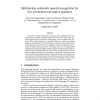Free Online Productivity Tools
i2Speak
i2Symbol
i2OCR
iTex2Img
iWeb2Print
iWeb2Shot
i2Type
iPdf2Split
iPdf2Merge
i2Bopomofo
i2Arabic
i2Style
i2Image
i2PDF
iLatex2Rtf
Sci2ools
110
click to vote
EJASMP
2010
2010
Optimizing Automatic Speech Recognition for Low-Proficient Non-Native Speakers
Computer Assisted Language Learning (CALL) applications for improving the oral skills of low-proficient learners have to cope with nonnative speech that is particularly challenging. Since unconstrained nonnative ASR is still problematic, a possible solution is to elicit constrained responses from the learners. In this paper we describe experiments aimed at selecting utterances from lists of responses. The first experiment on utterance selection indicates that the decoding process can be improved by optimizing the language model and the acoustic models, thus reducing the utterance error rate from 29-26% to 10-8%. Since giving feedback on incorrectly recognized utterances is confusing, we verify the correctness of the utterance before providing feedback. The results of the second experiment on utterance verification indicate that combining duration related features with a likelihood ratio (LR) yields an equal error rate (EER) of 10.3%, which is significantly better than the EER for the ...
Related Content
| Added | 17 May 2011 |
| Updated | 17 May 2011 |
| Type | Journal |
| Year | 2010 |
| Where | EJASMP |
| Authors | Joost van Doremalen, Catia Cucchiarini, Helmer Strik |
Comments (0)

